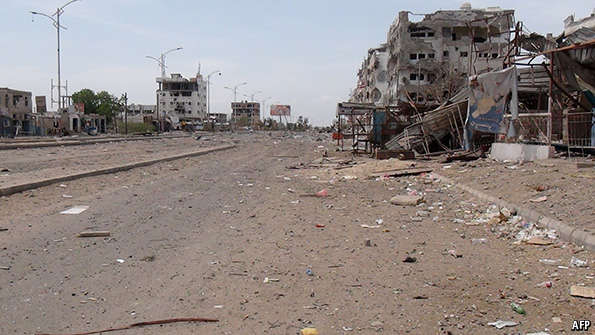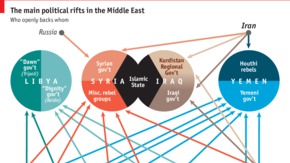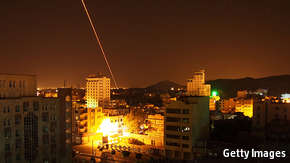
IF SAUDI ARABIA expected praise when it announced a five-day ceasefire in the air campaign it is leading in Yemen, it will be disappointed. As Adel al-Jubeir, the freshly minted foreign minister, declared the impending halt on May 8th, the Saudi-led coalition began an intense bombing campaign on Saada, a province in northern Yemen, in a reprisal against Shia rebels known as the Houthis.
Reports from residents of Saada say that the bombing has been relentless. "Homes, schools, everything has been destroyed," says a Houthi supporter in the capital who has friends and family in Saada. Aid workers say the bombardment will probably lead to a “mass loss of life”.
John Kerry, America's secretary of state, says that "a humanitarian catastrophe is building". Though America is helping the campaign with intelligence and logistics, it is growing wary of a war that seems ill-thought and increasingly ugly.
Mortars and rockets struck Najran, a Saudi town near the Yemeni border, two days ago, killing at least one Saudi soldier. The coalition began to issue warnings that it would treat the entire province of Saada, the Houthi heartland on the other side of the border, as a military target. It told the region’s 1m inhabitants to evacuate.
Aid agencies denounced what they saw as the collective punishment of Yemenis for the Houthis’ intransigence. Some say the strikes may constitute war crimes.
“It is impossible for the entire population of Saada province to leave within hours,” says Llanos Ortiz, an emergency coordinator at Médecins Sans Frontieres, an aid agency. “Many people have no transport or fuel due to the coalition's blockade. Many others have no access to information because the province’s phone networks are barely operational.”
Leading a coalition of other Sunni states, the recently enthroned Saudi king, Salman, and his son, Muhammad, serving as defence minister, launched the air campaign on March 26th. It aimed to push back the Zaydi Shia Houthi militia that had swept the recognised government of President Abd Rabbo Mansour Hadi out of the capital, Sana’a, and was advancing rapidly south towards the port of Aden, where Mr Hadi had sought refuge.
The Houthis, backed by army units loyal to the former president, Ali Abdullah Saleh, are regarded by Saudi Arabia and its allies as a client of Iran.
Yet the campaign has not prevented the Houthis from taking more territory. It has also left more than 1,200 people dead, more than half of whom were civilians, according to the World Health Organisation.
Nearly half of Yemen's 24m people are now dangerously hungry, according to the UN. The coalition's naval blockade has stopped most food and fuel getting into the country. Tankers are close to the port of Hodeidah—the second biggest port after Aden and the scene of heavy fighting—but the coalition has kept them away, arguing that they would help the Houthis.
Yemen depends on fuel to transport food, 90% of which is imported and transported overland, and water, which is mainly pumped from underground aquifers using diesel pumps.
“They are calling it a ceasefire, but they are continuing to blockade 24m people while intensifying their bombing campaign,” a frustrated aid official said, speaking on condition of anonymity. “This looks like yet another way of getting around pressure from America. They are playing a double game—doing one thing while feeding the international community a line.”
America has grown frustrated with broken promises by the Saudis to halt the fighting. In April the Saudis announced an end to the campaign, dubbed Operation Decisive Storm. But no sooner was the announcement made than the bombing resumed, after the Houthis took control of an army base that had remained loyal to the government.
Mr Jubeir, the Saudi foreign minister, said that the ceasefire will not begin until May 12th, and then only if the Houthis also agree to a truce. “The ceasefire will be throughout Yemen or nowhere in Yemen,” he said in Paris. “It’s up to the Houthis.”
Houthi supporters accuse the Saudis of "playing games", in the words of one in Sana'a. But it is unlikely that the Houthis will meet the terms of a ceasefire. The group has become notorious for negotiating truces before regrouping to launch new offensives.
Mediating between the parties has become more difficult. Neither America nor Saudi Arabia appear to have a direct line to the Houthis. Foreigners have previously relied on Jamal Benomar, a former UN envoy, to work with the Houthi leader, Abdelmalek al-Houthi, with whom he met regularly before the war began. Mr Benomar stepped down in April, apparently under pressure from officials in Riyadh who thought he was treating the Houthis too kindly. A new and inexperienced envoy, Ismail Ould Cheikh Ahmed, has been appointed to replace him, but it is unclear whether he will have much sway over the Houthis. If he doesn’t, Yemenis face harsh days ahead.
*************************************************************
UPDATE 1815 BST: FIRST PERSON ACCOUNT FROM SAADA UNDER THE BOMBS
A Médecins Sans Frontières (MSF) team spent last night in the city of Saada under intense bombing from the coalition led by Saudi Arabia. On Friday night the coalition gave an ultimatum to the population to leave the city and the surrounding area, as the whole province in the north of the country would become a military target.
Teresa Sancristóval, MSF emergency coordinator, was part of the team who worked thourough the night at the Al Gumhury hospital in Saada. She said:
“The bombing has been quite intense, more than twenty bombs have hit different buildings in the city, which has already suffered a huge level of destruction in recent weeks. There have been reports of 140 bombs being dropped on the city in a single day.
"Even though the city is noticeably emptier, many people were not aware of the order of evacuation—it hasn't been heard by the entire population. There is no electricity, no working telephones and yesterday there was a huge storm... We fear that everyone wasn't aware of the ultimatum. Even at the hospital last night we had seven women giving birth, five of them had to flee because of the intensity of the airstrikes.
"Some people were leaving the city in trucks, but many were leaving on foot as there is no fuel due to the blockade.
"Although many people had already left the town, the population that remains in the city are very scared and worried. The market, storage facilities and government buildings have been destroyed and many civilians are suffering the consequences. At the hospital, where those severely injured are brought in, the majority of the staff works and lives in the hospital.
“MSF’s team worked at the hospital throughout the night. Due to the bombing we had to move patients around the hospital, which is running out of safe places. The maternity ward is now also a pediatric and inpatient Ward for women.”

